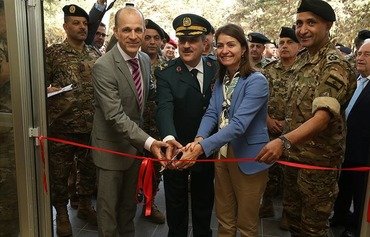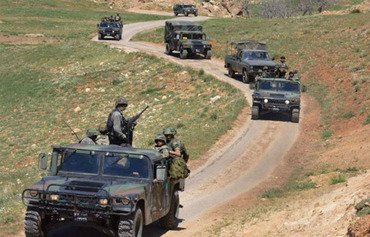Rehabilitation work is under way to expand and improve a border management training centre at the Rayak air base in Lebanon's Bekaa Valley.
The effort is part of the six-year Integrated Border Management (IBM) Lebanon project, which is funded by the EU and is being implemented by the Vienna-based International Centre for Migration Policy Development.
The training centre rehabilitation is part of the second phase of the project and is expected to be completed in September.
The centre aims to build the on-the-ground capacity of five Lebanese security agencies in order to ensure integrated border management. Training will focus on protecting the border and preventing smuggling, infiltration and terrorism.
When work has been completed, the centre will be able to accommodate 200 trainees per course, will provide advanced-level training to army and security forces and will facilitate the exchange of expertise.
It will include "large-scale venues for training and workshops, small rooms, offices, a training library, sleeping quarters, recreational spaces and a canteen", said Phil Johnson, who heads IBM Lebanon's team of technical experts.
Border regiments and other units will be taught how to patrol the borders and prevent infiltration, and will improve their performance and technical and tactical capability, according to the army’s Directorate of Orientation.
"This will actively serve the army and security services, by raising the level of collaboration and co-operation among different agencies and consolidating training methods," the directorate said.
Strengthening border control
The timing of the training centre rehabilitation is "important", Johnson said.
The situation on the eastern border is critical, he said, "and there is a need to control the flow of people in both directions across the Lebanese border, whether they are refugees, average civilians or terrorists".
The regiments charged with protecting the eastern border are adequately staffed, he said, but they need more training.
The centre's location, close to the border, and its expanded size, will make it possible for all the ground border regiments to train there, he added.
Once the centre is fully operational, ground forces will "train on how to protect and control the border, including dealing with routine applications to check the identity of travelers and how to search and question them", he said.
Project officials are working with the Army Command to define the centre's scope of work and the tenets of military training, which include protecting human rights, preventing human trafficking and drug smuggling, Johnson said.
"Other tasks would be to inspect vehicles and people, interrogate travelers, authenticate documents and handle a crime scene," he said.
"There is a dire need for all the security agencies to work together for the purpose of protecting and controlling the border, based on a Lebanese national strategy," Johnson said.
Importance of training centre
Border protection is a basic requirement for Lebanon, said military strategist Brig. Gen. George Nader, who is retired from the Lebanese military.
After the Syrian army withdrew from Lebanon, the first ground force was formed in 2009 to protect Lebanon's northern border, he told Al-Mashareq.
As a result of the ongoing war in Syria, a total of three ground units had to be formed -- one operating in Arsal -- along Lebanon’s 350-kilometre land border, he said.
A fourth ground regiment is set to be formed, Nader said, and it is anticipated that fifth and sixth regiments will follow to further solidify border control.
These new regiments will need more training in order to successfully fulfill their mission of protecting and controlling the border, he said.
The fourth regiment also will require training and support "to guarantee that it can be deployed to the farthest stretch of the border with Syria", he added.
For these reasons, Nader said, the centre is "extremely important".
"It will provide high-level training for its members and in-depth expertise in patrolling and protecting the border, as well as preventing smuggling and infiltration operations into Lebanon," he said.
"What is even more important, however, is that it will provide a handbook of shared language and techniques in the field of border protection," he added.

![Lebanese army ground units receive training on border protection. [Photo courtesy of the army’s Directorate of Orientation]](/cnmi_am/images/2017/05/10/7832-Lebanon-army-borders-600_384.jpg)






